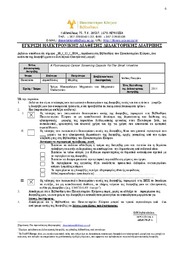A fluoroscopic cancer screening capsule for the small intestine

Date
2014-12Author
Demosthenous, Panayiota M.Publisher
Πανεπιστήμιο Κύπρου, Πολυτεχνική Σχολή / University of Cyprus, Faculty of EngineeringPlace of publication
CyprusGoogle Scholar check
Keyword(s):
Metadata
Show full item recordAbstract
Η πρόωρη ανίχνευση καρκίνου είναι σημαντική για την επιτυχή θεραπεία και επιβίωση του θεράποντα. Ένα όργανο του πεπτικού συστήματος που αποτελεί πρόκληση ως προς την ανίχνευση πρώιμων καρκινωμάτων, είναι το λεπτό έντερο, που λόγο της περιπεπλεγμένης δομής του είναι δύσκολα προσβάσιμο από διαγνωστικά εργαλεία. Το πρόβλημα της προσβασιμότητας του, έρχονται να επιλύσουν οι κάψουλες ενδοσκόπησης, οι οποίες όμως δεν είναι ιδανικές στο να ανιχνέυουν καρκίνο στα πρώτα στάδια της εξέλιξης του.
Ο στόχος της παρούσας έρευνας είναι κατασκευή μιας διαγνωστικής κάψουλας, που είναι ειδικά σχεδιασμένη για να ανιχνέυει φθορισμό στο γαστρεντερικό σύστημα. Η κάψουλα αυτή σε συνδυασμό με μια χρωστική ουσία η οποία επιλεκτικά προσκολλάται στα καρκινικά κύτταρα και τα καθιστά ανιχνέυσιμα μέσω του φθορισμού της, αναμένεται ότι θα χρησιμοποιηθεί για την αποδοτική ανίχνευση πρώιμων καρκινωμάτων στο λεπτό έντερο.
Η δημιουργία μιας τέτοιας κάψουλας αποτελεί ιδιαίτερη πρόκληση ως προς τη σχεδίαση των ηλεκτρονικών της, αφού πρέπει να είναι μικρή σε μέγεθος και να καταναλώνει ελάχιστη ισχύ. Επιπρόσθετα, η πολυπλοκότητα μιας τέτοιας έρευνας αποδίδεται στο γεγονός ότι$^.$ τα χαμηλά επίπεδα έντασης του φθορισμού, δύσκολα διαχωρίζονται από την υψηλή ένταση της ακτινοβολίας διέγερσης, αφού τα δύο φάσματα βρίσκονται συγκριτικά κοντά. Early detection of cancer is crucial to the success of treatment and the survival of patients. One of the organs that present a diagnostic challenge in regards to early cancer detection is the small intestine due to its inaccessibility and convoluted structure. Even though swallowable imaging capsules have been developed to address this issue, they are unsuitable for the detection of early-stage or flat cancers.
The goal of the presented research is to develop a screening capsule, designed specifically for fluorescence detection in the gastrointestinal tract. By using this capsule in conjunction with novel molecular contrast agents, which are selectively probed to cancerous cells, it is expected that cancers of the small intestine could be detected at a very early stage, with high sensitivity and at low cost.
The development of such a screening capsule is extremely challenging, both in terms of optical design and electronics design, in addition to its multidisciplinary nature. On the one hand the emitted light intensity of fluorescence is several orders of magnitude smaller than the excitation intensity, whilst on the other hand the power budget for the electronics is extremely low. The information storage requirements and the limited size of the capsule are additional factors that complicate the design further. This thesis presents an innovative, mixed-signal electronic capsule, which overcomes these challenges.
